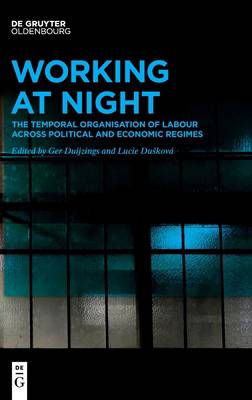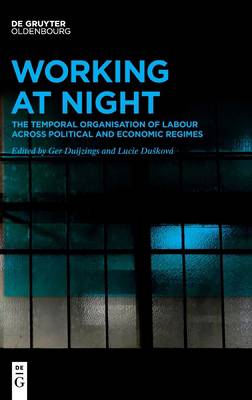
- Afhalen na 1 uur in een winkel met voorraad
- Gratis thuislevering in België vanaf € 30
- Ruim aanbod met 7 miljoen producten
- Afhalen na 1 uur in een winkel met voorraad
- Gratis thuislevering in België vanaf € 30
- Ruim aanbod met 7 miljoen producten
Zoeken
Working at Night
The Temporal Organisation of Labour Across Political and Economic Regimes
€ 185,45
+ 370 punten
Omschrijving
The night represents almost universally a special, liminal or "out of the ordinary" temporal zone with its own meanings, possibilities and dangers, and political, cultural, religious and social implications. Only in the modern era was the night systematically "colonised" and nocturnal activity "normalised," in terms of (industrial) labour and production processes. Although the globalised 24/7 economy is usually seen as the outcome of capitalist modernisation, development and expansion starting in the late nineteenth century, other consecutive and more recent political and economic systems adopted perpetual production systems as well, extending work into the night and forcing workers to work the "night shift," normalising it as part of an alternative non-capitalist modernity. This volume draws attention to the extended work hours and night shift work, which have remained underexplored in the history of labour and the social science literature. By describing and comparing various political and economic "regimes," it argues that, from the viewpoint of global labour history, night labour and the spread of 24/7 production and services should not be seen, only and exclusively, as an epiphenomenon of capitalist production, but rather as one of the outcomes of industrial modernity.
Specificaties
Betrokkenen
- Uitgeverij:
Inhoud
- Aantal bladzijden:
- 279
- Taal:
- Engels
- Reeks:
- Reeksnummer:
- nr. 15
Eigenschappen
- Productcode (EAN):
- 9783110752885
- Verschijningsdatum:
- 3/10/2022
- Uitvoering:
- Hardcover
- Formaat:
- Genaaid
- Afmetingen:
- 156 mm x 234 mm
- Gewicht:
- 566 g

Alleen bij Standaard Boekhandel
+ 370 punten op je klantenkaart van Standaard Boekhandel
Beoordelingen
We publiceren alleen reviews die voldoen aan de voorwaarden voor reviews. Bekijk onze voorwaarden voor reviews.







